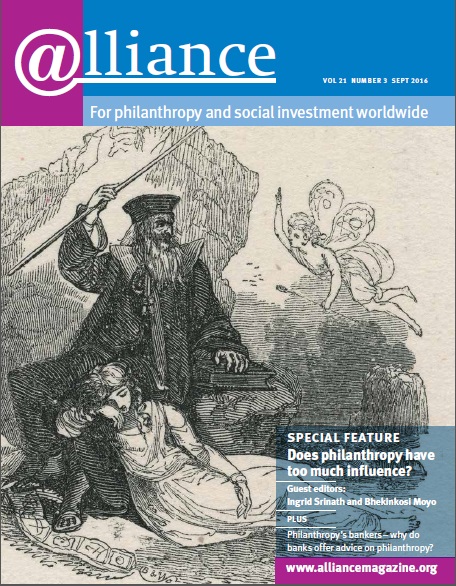As a participant in the Funders Initiative (run by the Environmental Grantmakers Association and the European Climate Foundation) at COP21, I found many points of agreement as I read the June issue of Alliance. It might be of interest to other funders to hear an Australian perspective.
After returning from Paris in December, I reflected on what I had learned. Above all, I had come to see that climate change is a lens that runs across all our work in philanthropy. It is not just an environmental issue. Beyond mitigation, which is critical, there are many challenges to prepare for as we learn to live in a changing climate.
‘Climate change is a lens that runs across all our work in philanthropy. It is not just an environmental issue.’
There are also opportunities for new jobs in the transformed low-carbon future – green plumbing, technology associated with renewable energy, climate-proof construction and so on. Young people across the world who are already facing the challenge of unemployment will need to develop skills that will be useful in our low-carbon future.
Climate change has become a lens through which we consider the work we do in homelessness and affordable housing, healthy and cohesive communities, education and employment, and Sustainable Melbourne.
I was particularly drawn by Florence Tercier and Anne Henshaw’s comment that ‘There is a real opportunity to build the social justice element of climate change.’ This concept of climate justice is evident in the projects coming forward to our foundation. For example, one project focused on how low-income people who are renting can ensure they have access to low-cost, renewable energy and air conditioning (powered by renewables) to face heatwaves. Heatwaves have killed more people in Australia in recent times than bushfires. Community resilience in the face of disasters is an area we are allocating additional funds to, with a view to especially supporting people who are older or disadvantaged.
We are working on an energy-efficient not-for-profit project with the Alternative Technology Association and another private foundation. We are coming to the end of the pilot study and aim to scale this with social finance partners such as Social Enterprise Finance Australia and Bank Australia.
These are small examples of a bigger effort. Every foundation across the world must think about how it incorporates climate change mitigation and adaptation as a lens across its grants programme. As Christiana Figueres said to our Funders Initiative delegation, ‘Business as usual is not an option.’
Catherine Brown
CEO, Lord Mayors Charitable Foundation, Melbourne
On the same topic: ‘Engagement needs more time to prove itself’ by Julian Poulter and ‘Act fast and fairly on climate’ by Florence Miller.






Comments (0)